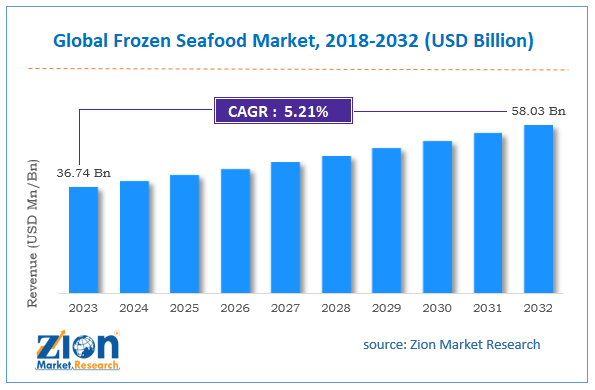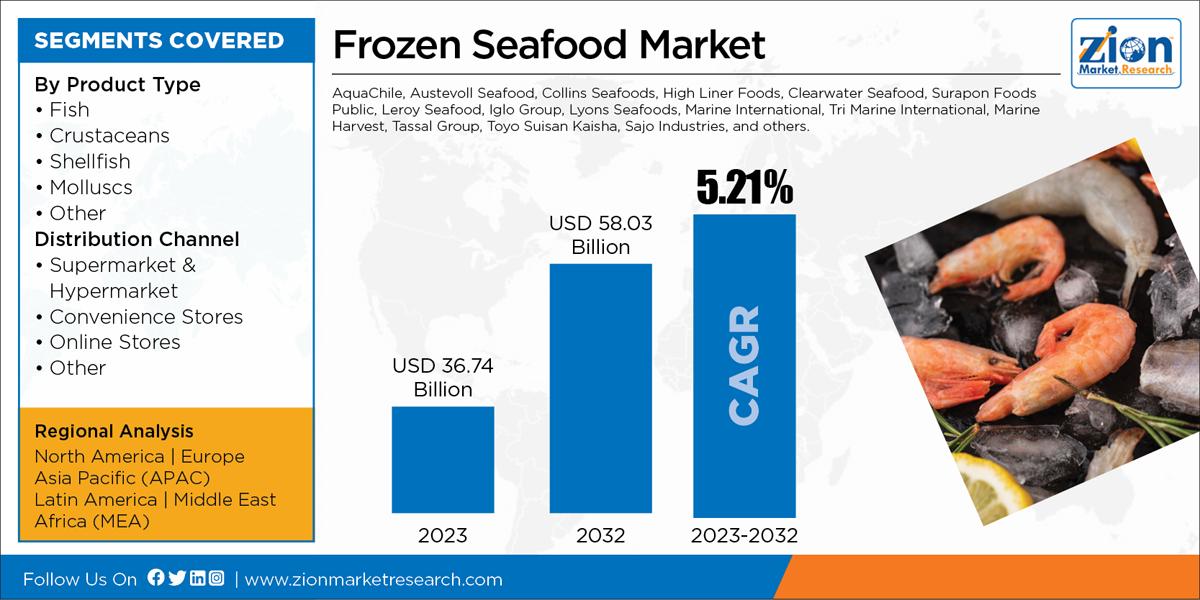Frozen Seafood Market Size, Share, Trends, Growth and Forecast 2032

Frozen Seafood Market By Product Type (Fish, Crustaceans, Shellfish, Molluscs, And Others) and By Distribution Channel (Supermarket & Hypermarket, Convenience Stores, Online Stores, And Others): Global Industry Perspective, Comprehensive Analysis And Forecast, 2024- 2032
| Market Size in 2023 | Market Forecast in 2032 | CAGR (in %) | Base Year |
|---|---|---|---|
| USD 36.74 Billion | USD 58.03 Billion | 5.21% | 2023 |
The global Frozen Seafood Market size was worth around USD 36.74 Billion in 2023 and is predicted to grow to around USD 58.03 Billion by 2032 with a compound annual growth rate (CAGR) of roughly 5.21% between 2024 and 2032.
The rising consumption of seafood, increase in awareness of the health benefits of seafood, and the growing numbers of supermarkets & hypermarkets are the key factors driving the growth of the frozen seafood market. Furthermore, the growing adoption of quick freezing technology to freeze seafood is expected to provide a significant opportunity for the players operating in this market.
Frozen Seafood Market: Overview
Seafood is one of the most perishable food items, hence it is essential to give special care regarding its freezing until it reaches the consumer. Seafood contains high-quality protein and other essential nutrients. Seafood protein is easier to digest as seafood have less connective tissue than red meat & poultry. Seafood contains less than 5% of total fat. Seafood contains polyunsaturated fats such as omega-3 fatty acid which is not produced in the human body. It is helpful for heart disorders in human beings and is essential for brain and vision development in infants. Seafood is the natural source of vitamin D & A, and B-complex which are useful for the proper development of the nervous system & bone and healthy vision & skin. Seafood provides minerals such as calcium & iron, selenium, iodine, zinc. Selenium acts as an antioxidant and protects from cell damage. Zinc is helpful for cell growth and boosts the immune system. Iron is important for red blood cell production. Therefore, seafood is an important part of healthy and well-balanced diet.
Seafood needs to stay fresh before freezing. Frozen seafood can get spoil if it thaws while transportation. After the fish is caught guts and blood starts degrading which leads to the fishy flavor. Freezing locks the freshness, nutrients, and flavor of seafood. Frozen fish has the least carbon footprint than fresh fish. Freezing prevents bacterial growth as well as prevents from getting spoilt. Freezing seafood doesn’t affect its nutritive values. Vitamins such as A & D, fats, and proteins do not get affected due to freezing.
The report covers detailed analysis and forecast for the frozen seafood market on a global and regional level from 2024 to 2032. The study offers historic data of 2018-2023 along with a forecast from 2018 to 2024 based on revenue (USD Billion). The study comprises a comprehensive view of the market with the review of market drivers, restraints, and opportunities. It also provides the level of impact of drivers and restraints on the frozen seafood market between 2024 and 2032.
The Impact of COVID-19 on the Frozen Seafood Market
The COVID-19 outbreak created a severe public health emergency globally, with its quick spread to more than 150 countries. Numerous countries worldwide declared emergencies and announced complete nationwide, statewide, or citywide lockdowns to combat & control the spread of this disease, halting all travel, transport, manufacturing, educational institutions, and non-essential trade, significantly impacting many industries globally. Moreover, governments across the globe closed fish markets and halted processing operations. Several virus-affected regions prohibited the trade of frozen seafood, resulting in significant losses for seafood manufacturers. Local sourcing and online presence appeared to be among the most effective ways to create cash in the sector during the pandemic.
However, the frozen seafood market grew during the lockdown since it has a longer shelf life than fresh fish and is anticipated to flourish post-COVID as well. Additionally, people became more health conscious and preferred products that provide essential nutrients to the body, and seafood became a priority, positively impacting the frozen seafood market. One of the most significant forces that have carried the seafood industry through the upheaval of 2020 is the shift in consumer buying preference at retail, with the sales of all kinds of seafood booming in the grocery stores and through e-commerce channels.
The study included a detailed competitive scenario and type portfolio of key vendors. The report evaluates Porter’s Five Forces model to analyze the different factors affecting the growth of the frozen seafood market. Moreover, the study encompasses a market attractiveness analysis, which provides the most attractive and least attractive market segments information by product, distribution channel, and region.
Frozen Seafood Market: Segmentation
The report includes detailed segmentation of frozen seafood market based on product type, distribution channel, and region.
Frozen seafood product line includes fish, crustaceans, shellfish, mollusks, and others. In product segment of frozen seafood market, crustaceans are anticipated to lead the market owing to growing demand for exotic seafood coupled with high- profit margin associated with crustaceans. In terms of revenue, fish was the second largest segment after crustaceans in 2017 due to its simple storage application and easy preparation process.
On the basis of the distribution channel, the frozen seafood market is segmented into online stores, convenience stores, supermarket & hypermarket, and others. Hypermarket & supermarket segment is projected to be the dominating segment during the forecast period.
Frozen Seafood Market Size: Report Scope
| Report Attributes | Report Details |
|---|---|
| Report Name | Frozen Seafood Market Size Report |
| Market Size in 2023 | USD 36.74 Billion |
| Market Forecast in 2032 | USD 58.03 Billion |
| Growth Rate | CAGR of 5.21% |
| Number of Pages | 188 |
| Forecast Units | Value (USD Billion), and Volume (Units) |
| Key Companies Covered | AquaChile, Austevoll Seafood, Collins Seafoods, High Liner Foods, Clearwater Seafood, Surapon Foods Public, Leroy Seafood, Iglo Group, Lyons Seafoods, Marine International, Tri Marine International, Marine Harvest, Tassal Group, Toyo Suisan Kaisha, Sajo Industries, and others |
| Segments Covered | By End User, By Type,By Distribution Channel And By region. |
| Base Year | 2023 |
| Historical Year | 2018 to 2022 |
| Forecast Year | 2024 - 2032 |
| Customization Scope | Avail customized purchase options to meet your exact research needs. Request For Customization |
Frozen Seafood Market: Regional Analysis
Major regional segment analyzed in this report include North America, Europe, Asia Pacific, Latin America and the Middle East & Africa with its further bifurcation into major countries including the U.S. Germany, France, UK, China, Japan, India, and Brazil.
By geography, Europe held the largest market share in terms of revenue in 2023. The industry is expected to be driven by increasing demand for seafood and increasing cold storage chain in the region. Europe was followed by North America and Asia Pacific in terms of revenue. The Asia Pacific is projected to show significant growth in the years to come. This is mainly due to increasing population, urbanization, and cold chain network in the region.
Frozen Seafood Market: Competitive Analysis
The report provides detailed competitive outlook including market share and company profiles of the key players operating in the global market. Key players operating in frozen seafood market are
- AquaChile
- Austevoll Seafood
- Collins Seafoods
- High Liner Foods
- Clearwater Seafood
- Surapon Foods Public
- Leroy Seafood
- Iglo Group
- Lyons Seafoods
- Marine International
- Tri Marine International
- Marine Harvest
- Tassal Group
- Toyo Suisan Kaisha
- Sajo Industries
- others.
Global Frozen Seafood Market: Product Type Segment Analysis
- Fish
- Crustaceans
- Shellfish
- Molluscs
- Other
Global Frozen Seafood Market: Distribution Channel Segment Analysis
- Supermarket & Hypermarket
- Convenience Stores
- Online Stores
- Other
Global Frozen Seafood Market: Regional Segment Analysis
- North America
- The U.S.
- Europe
- UK
- France
- Germany
- Asia Pacific
- China
- Japan
- India
- Latin America
- Brazil
- Middle East and Africa
Table Of Content
Methodology
FrequentlyAsked Questions
The global Frozen Seafood Market size was worth around USD 36.74 Billion in 2023 and is predicted to grow to around USD 58.03 Billion by 2032
annual growth rate (CAGR) of roughly 5.21% between 2024 and 2032
The largest share of the Frozen Seafood Market is held by Asia Pacific. Developing countries of Asia Pacific such as China, Japan, and India will be dominating the market scenario mainly due to the rising constructional activities. The growth of Asia-Pacific region is expected to be followed by the Middle East and North America. Also, significant growth is expected from Western Europe owing to the developments taking place in this region especially in countries such as Italy, Germany, the U.K, France, and Spain. However, growth in Africa, Latin America, and Eastern Europe is anticipated to be moderate over the forecast period.
AquaChile, Austevoll Seafood, Collins Seafoods, High Liner Foods, Clearwater Seafood, Surapon Foods Public, Leroy Seafood, Iglo Group, Lyons Seafoods, Marine International, Tri Marine International, Marine Harvest, Tassal Group, Toyo Suisan Kaisha, Sajo Industries, and others
RelatedNews
HappyClients
Zion Market Research
Tel: +1 (302) 444-0166
USA/Canada Toll Free No.+1 (855) 465-4651
3rd Floor,
Mrunal Paradise, Opp Maharaja Hotel,
Pimple Gurav, Pune 411061,
Maharashtra, India
Phone No +91 7768 006 007, +91 7768 006 008
US OFFICE NO +1 (302) 444-0166
US/CAN TOLL FREE +1 (855) 465-4651
Email: sales@zionmarketresearch.com
We have secured system to process your transaction.
Our support available to help you 24 hours a day, five days a week.
Monday - Friday: 9AM - 6PM
Saturday - Sunday: Closed






